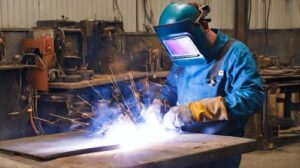Table of Contents
Dreaming of diving into the world of welding but unsure about the time commitment? Wonder no more! In this guide, we’ll walk you through the journey of becoming a welder, answering the burning question on everyone’s minds: How long does it take to become a welder?
Strap on your welding helmet, and let’s ignite the sparks of knowledge!
Demystifying the Journey: How Long Does It Take to Become a Welder?
So, you’re considering a career in welding? Excellent choice! But before you dive headfirst into the world of welding arcs and molten metal, it’s essential to understand the timeline involved. Let’s break it down:
1. Initial Training: Getting Started
- Trade School or Vocational Program: Many aspiring welders opt for formal training programs from vocational schools or community colleges. These programs typically range from six months to two years, depending on the depth of the curriculum and the type of certification desired.
- Apprenticeships: Another popular route is to pursue an apprenticeship with a seasoned welder or through a welding union. Apprenticeships combine on-the-job training with classroom instruction, lasting anywhere from one to four years.
2. Gaining Experience: Practice Makes Perfect
Once you’ve completed your initial training, it’s time to put your newfound skills to the test in the real world. This phase of your journey is all about gaining hands-on experience and honing your craft. Here’s what to expect:
- Entry-Level Positions: As a newly minted welder, you’ll likely start out in entry-level positions, such as welding assistant or junior welder. These roles provide invaluable on-the-job training and opportunities to refine your skills under the guidance of experienced professionals.
- Continuing Education: The learning doesn’t stop once you’ve landed your first job. Many welders choose to pursue additional certifications or specialized training to enhance their skill set and advance their careers. Whether it’s mastering a new welding technique or becoming certified in a specific type of welding, ongoing education is key to staying competitive in the field.
3. Career Advancement: Reaching New Heights
As you gain experience and expertise in welding, you’ll have the opportunity to take your career to new heights. Whether moving up the ladder within your current company or branching out into new industries, the sky’s the limit for ambitious welders. Here are some potential paths for career advancement:
- Welding Inspector: If you have a keen eye for detail and a strong understanding of welding standards and regulations, a career as a welding inspector could be in your future. Welding inspectors ensure that welding work meets quality and safety standards, making it a critical role in many industries.
- Welding Supervisor or Manager: For those with strong leadership skills and a knack for organization, a supervisory or managerial role may be the next logical step in your career progression. Welding supervisors and managers oversee day-to-day operations, coordinate workflow, and ensure projects are completed on time and within budget.
- Entrepreneurship: Some welders choose to strike out on their own and start their own welding businesses. Whether it’s specializing in custom fabrication, offering mobile welding services, or providing consulting and design services, entrepreneurship offers endless possibilities for ambitious welders with a knack for business.
Conclusion
So, how long does it take to become a welder? The answer is it depends! From formal training programs to on-the-job apprenticeships, the journey to becoming a welder can take anywhere from a few months to several years.
But one thing’s for sure: with dedication, hard work, and a passion for the craft, the sky’s the limit for aspiring welders. So grab your welding helmet, fire up your torch, and get ready to embark on an exciting and rewarding career in welding!
FAQs:
Are there any prerequisites for welding training programs?
While specific prerequisites can vary from program to program, most welding training programs require applicants to have a high school diploma or GED. Some programs may also have additional requirements, such as a minimum age or physical fitness assessment.
Can I become a welder without formal training?
While formal training is highly recommended for aspiring welders, it is possible to learn the trade through on-the-job training or self-study. However, keep in mind that many employers prefer to hire candidates who have completed formal training programs or apprenticeships.
How much can a welder earn?
Welders’ salaries vary depending on factors such as experience, location, and industry. On average, welders in the United States earn around $40,000 to $60,000 per year.
Is welding a dangerous profession?
While welding can involve hazards such as heat, fumes, and electrical currents, proper safety precautions can mitigate risks. Welders must undergo safety training and wear protective gear to minimize the likelihood of accidents.
Are there opportunities for career advancement in welding?
Yes, experienced welders can advance to supervisory roles, such as welding inspector or welding supervisor, with additional training and certifications. Additionally, specializing in niche areas of welding can lead to higher-paying opportunities.



